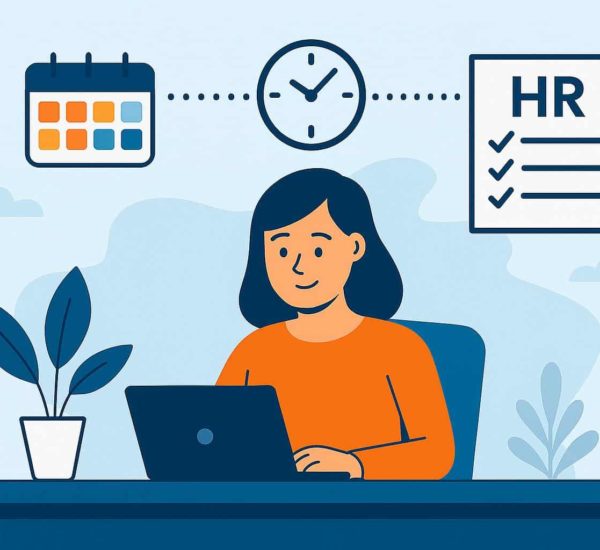During times of stress and uncertainty, employees instinctively turn to HR for guidance and support. But what about HR? HR professionals are constantly looking out for everyone else, often to the point where their own needs fall by the wayside. Despite being on the frontlines, HR teams are still affected by the same stressful situations as their colleagues but rarely have a dedicated support system for themselves.
It’s a bit like the old oxygen mask analogy: you can’t help others until you’ve taken care of yourself. In a workplace crisis, HR professionals need to make sure they’re prioritizing their well-being too.
HR for HR: Who’s Caring for the Caregivers?
HR professionals are the backbone of many organizations, ensuring employee well-being, managing conflicts, and developing growth strategies. But amidst all the responsibilities, who takes care of the HR professionals? This is where the concept of HR for HR comes into play, highlighting the often-overlooked need for HR professionals to receive care and support.
The Invisible Stress of HR Professionals
It’s no secret that HR carries a heavy burden. Between managing employee relations, dealing with crises, and navigating compliance issues, HR professionals are constantly on the go. The irony is that while HR is often responsible for creating wellness programs and taking care of others, they rarely have the same support. This creates a situation where HR for HR is not just a nice-to-have, but a must.
Many HR professionals find themselves asking, “Where do I turn for help with HR?” The answer lies in fostering a culture of HR care—a system where HR professionals can seek support and look after their own well-being.
Self-Care for HR
The question “Who’s your HR?” raises an important point. While HR departments tend to every other team’s needs, they need to have their own support structures. Internal care programs, mental health days, and professional growth opportunities should be offered to HR teams as well.
One of the biggest challenges for HR professionals is maintaining a balance between the needs of others and themselves. By creating HR for HR solutions, HR departments can build communities where they can discuss challenges, share ideas, and provide mutual support. After all, self-care starts with recognizing that HR needs help too.

The Importance of HR Wellbeing
HR professionals are often the unsung heroes of an organization, tasked with navigating difficult situations, mediating conflicts, and supporting employees through crises. However, this vital role comes with a unique set of challenges that can take a serious toll on their own well-being. For HR to effectively support the workforce, they must first ensure their own mental, emotional, and physical health is prioritized.
Impact of Overwork and Stress
When HR professionals are overworked or stressed, it impacts their ability to make sound decisions, offer compassionate guidance, and create a positive workplace culture. HR for HR is essential because if HR leaders are not well-supported, they risk burnout, which ultimately affects the entire organization. Just as they encourage employees to take care of themselves, HR needs to invest in their own self-care practices.
The Ripple Effect
The ripple effect of poor HR well-being is significant. It can lead to low morale within the team, decreased productivity, and a rise in turnover—not just in HR, but throughout the organization. On the other hand, when HR prioritizes its wellbeing, they create a healthier, more resilient work environment for everyone.
Fostering a Thriving Environment
Fostering HR wellbeing also ensures that HR teams can continue being the backbone of the organization, delivering quality support to employees, staying proactive in crisis management, and maintaining strong communication across the board. Ultimately, taking care of HR isn’t just about individual health—it’s about the overall health of the organization. When HR is thriving, so is everyone else.
Practical Tips for HR Self-Care
HR professionals often carry the weight of the entire organization during challenging times. While they’re busy supporting everyone else, they sometimes overlook their own needs. Fortunately, there are several strategies HR practitioners can use to nurture their own well-being, even amid a crisis.
So how can HR professionals take better care of themselves? Here are some practical tips for fostering HR care:
Take Breaks
HR professionals are always putting out fires, but it’s crucial to step away and recharge.
Use Wellness Programs
Just like employees, HR should take full advantage of wellness and mental health programs. Make self-care part of your routine.
Seek Help
If you’re feeling overwhelmed, don’t hesitate to ask for help with HR. External HR resources, professional networks, or even an AMP care platform can provide guidance.
Leverage Internal Support Channels
HR teams may not always have a dedicated person to turn to, but that doesn’t mean they have to go it alone. Instead of waiting for someone to step up, HR should proactively connect with managers or leadership teams for support. Finding mentors or trusted leaders within the company who understand the pressures of the role can provide much-needed relief. A mentor doesn’t have to be an HR expert—what matters is finding someone who can offer a listening ear and practical advice.
Build a Peer Network Outside Your Company
While internal connections are vital, it’s just as important to build relationships with peers in the HR industry. Joining professional groups or HR communities—whether through social media, Slack channels, or industry organizations—provides a safe space to share ideas, ask questions, and receive support from those who truly understand the unique challenges of HR work. Engaging with external HR professionals allows for idea-sharing, emotional support, and even collaboration on best practices.
Practice What You Preach About Self-Care
HR is often the first to encourage employees to take time off, disconnect after hours, and avoid burnout. But how often does HR follow this same advice? It’s crucial for HR professionals to “walk the talk” and model the behavior they recommend to their teams. Prioritizing personal self-care—whether that’s taking a break, engaging in hobbies, or spending time with family—helps maintain energy levels and prevents burnout, which is essential for supporting others effectively.
Commit to Small, Daily Self-Care Habits
When the demands of the job are high, it’s easy to let personal well-being slip through the cracks. To counter this, commit to three simple self-care rituals each day. These could include a 10-minute walk outside, staying hydrated, doing a few breathing exercises, or setting time aside for lunch without distractions. Making these small, mindful habits part of your daily routine can significantly impact mental health and productivity. Use your calendar or reminders to ensure they happen!

Set Clear Boundaries—and Stick to Them
In a crisis, HR professionals can be inundated with requests for help. Whether it’s personal or professional, it’s crucial to set clear boundaries about what you can realistically handle. Start every conversation by clarifying the kind of support the person is seeking—whether they need someone to listen, offer solutions, or simply vent. Establishing limits helps avoid burnout and ensures you can provide the best possible support without overextending yourself.
Take Breaks—and Actually Disconnect
It’s easy to be “always on,” especially when HR is at the center of crisis management. But it’s vital to carve out time to disconnect from work fully. Schedule short breaks throughout the day to clear your mind, and make sure your evenings and weekends are free of work-related tasks. This helps reset your mental energy and prepares you to tackle the next challenge with a fresh perspective.
Seek Professional Help When Needed
Sometimes the stress and pressure are too much to handle alone. HR professionals should consider seeking external support, such as counseling or professional coaching, to manage the emotional and psychological toll of their roles. Access to mental health professionals or leadership coaches can provide valuable tools and techniques to cope with stress, build resilience, and maintain overall well-being.
It’s time for HR to recognize that self-care is not selfish—it’s necessary. By embracing HR for HR, professionals can create a healthier work environment for themselves and, by extension, their organizations.
Leveraging Technology for HR Support
In today’s fast-paced workplace, leveraging technology is crucial. Various tools can help HR teams manage workflows, automate tasks, and reduce burnout. These tools allow HR professionals to focus more on strategic tasks and less on day-to-day firefighting, ultimately contributing to better work-life balance.
HR departments can also implement HR for HR platforms that offer training in stress management, mental health support, and even emotional resilience. By utilizing these tools, HR professionals can ensure they’re taking the necessary steps to care for themselves.
Conclusion: Prioritizing HR Care
For too long, HR professionals have carried the weight of their organizations without the support they need. It’s time for that to change. By focusing on HR well-being, organizations can create a sustainable culture of care, ensuring that the well-being of HR professionals is prioritized just as much as the rest of the workforce.
When HR takes care of themselves, they are better equipped to take care of everyone else.



